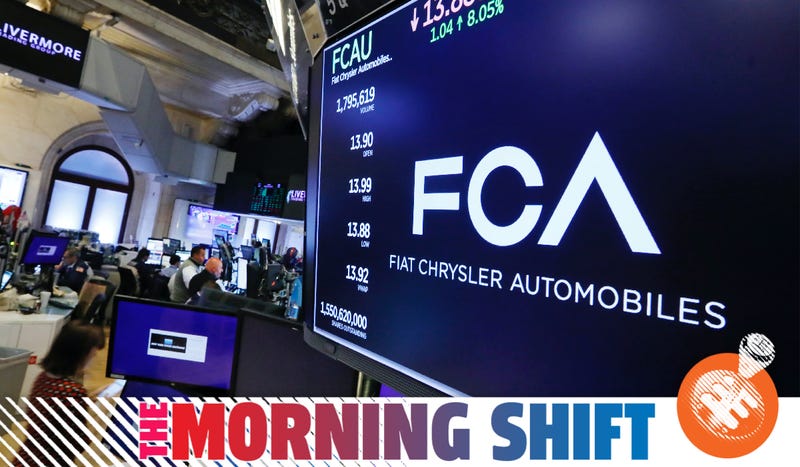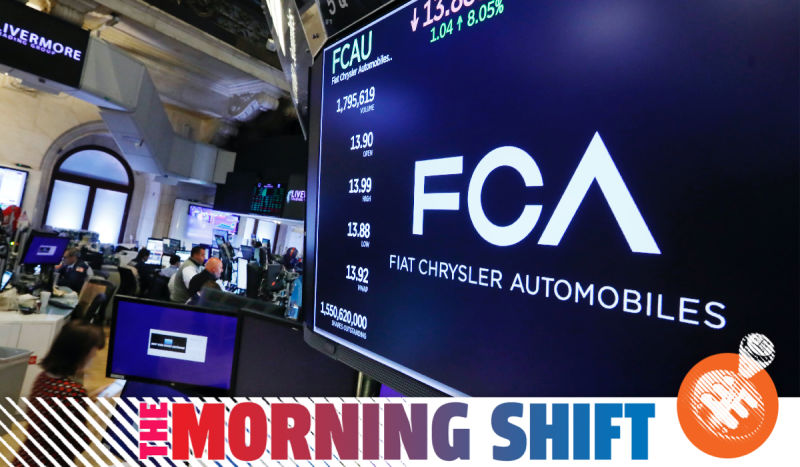
 The Morning ShiftAll your daily car news in one convenient place. Isn’t your time more important?
The Morning ShiftAll your daily car news in one convenient place. Isn’t your time more important? Fiat Chrysler’s latest best hope just collapsed, Ford shuts down a plant, and GM defends shutting down a plant. All that and more in the Morning Shift for Thursday, June 6, 2019.
1st Gear: Let the Autopsy Begin
The grand merger plan between Renault and Fiat Chrysler, just barely a week old, completely fell apart yesterday evening. It really did come out of nowhere – everything was great and awesome until suddenly everyone put out statements saying the deal was completely dead.
But who the hell killed it depends on who you ask. Here’s the Wall Street Journal, with an account blaming increasingly spiteful Renault partner Nissan:
With Nissan representatives prepared to abstain if Renault’s board took a vote, the French government asked for more time so that Finance Minister Bruno Le Maire could use an upcoming visit to Japan to press the case for a merger with the Japanese, according to a French official.
Complicating the consummation of the deal was the two-decade partnership between Renault and Nissan in which they, along with Mitsubishi Motors Corp., share technology and vehicle parts. Renault owns 43.4% of Nissan, while Nissan owns 15% of Renault.
People close to Fiat Chrysler and Renault said for the merger to succeed it needed Nissan’s buy-in, in part because the Japanese company co-owns some of the intellectual property that underpins the alliance.
Advertisement
But “oh ho ho,” Nissan says, “it was actually Renault’s fault!”
Jean-Dominique Senard, who replaced Mr. Ghosn as chairman of Renault, fueled mistrust at Nissan by keeping the Japanese auto maker in the dark about the merger talks before they were publicly disclosed, according to people familiar with the matter.
Mr. Senard, who was in line to lead the combined company, emailed Nissan Chief Executive Hiroto Saikawa about the proposal hours before it was made public, the people said.
“The idea you would negotiate a merger without speaking with your 20-year partner is absolutely extraordinary,” a person close to Nissan said. “It’s about trust, and that’s the problem here.”
Advertisement
Or was it neither Nissan nor Renault, but actually the state of France itself? Here’s Reuters:
The French government, which has a 15% stake in Renault, had welcomed the merger plan, but overplayed its hand by pushing for a series of guarantees and concessions that eventually exhausted the patience of FCA, sources familiar with the talks said.
Wrong-footed by FCA’s decision to withdraw its merger proposal late on Wednesday, a French official called FCA Chairman John Elkann early on Thursday to see if he might reconsider, but was rebuffed, one of the sources said.
While France has a long history of government interference in business, President Emmanuel Macron came to power promising a broadly market-friendly agenda. The failure of the FCA deal risks leaving Renault locked into Europe’s stagnant mass-market for cars, and deterring other potential suitors, analysts said.
Advertisement
Well, at least no one is explicitly blaming Fiat Chrysler yet, but I’m sure we’ll get there.
The collapse of the deal is a bit mystifying, considering how good it seemed to be on the surface for everyone involved. Renault would get better access to non-European markets, Fiat Chrysler would finally be free of the burden of actually having to be an independent company (something it’s sought for years), and Nissan would maybe have been able to use it as an excuse to bail on the partnership with Renault it’s apparently detested for quite a while now.
Oh well.
2nd Gear: Toyota and Subaru Team Up on Electric SUV
While Toyota and Subaru have been innovators in years past, they’re both woefully behind on electric vehicles when compared to companies like General Motors, Volkswagen, and of course, Tesla. To fix that—and also to spread the massive upfront investment costs around a bit—they’re teaming up to develop an electric SUV, Reuters says:
Toyota Motor Corp and Subaru Corp on Thursday said they plan to jointly develop a battery-electric sport-utility vehicle (SUV) on a platform produced together as they seek to split the cost of producing the lower-emissions car.
The pair will apply Subaru’s all-wheel-drive technologies and Toyota’s vehicle electrification technologies to the new SUV, which each will sell under its own brands, the automakers said in a statement.
Advertisement
We love the Toyota 86/Subaru BRZ, so at least there’s precedent for a partnership between the two working out well.
We wish the couple hundreds of fat children. Or electric SUVs. Something like that.
3rd Gear: Ford To Close British Plant
Ford announced today that it will close its Brigend Plant in Wales, primarily known these days for making small engines for cars like the Ford Fiesta and Ford Focus, the Financial Times’ auto industry correspondent said on Twitter:
Advertisement
Ford is denying that Brexit is a factor in the plant closure, but I’m not sure that’s making the workers feel any better:
Here’s hoping they all land on their feet.
4th Gear: India to Reportedly Order 40 Percent of Ubers to Go Electric
India is reportedly about to order 40 percent of vehicles used for ridehailing apps like Uber and Ola to go electric, according to Reuters:
Uber and Ola, both backed by Softbank Group, would need to start converting their fleet as early as next year to achieve 2.5% electrification by 2021, 5% by 2022, 10% by 2023 before hiking it to 40%, according to the person and the records that have been reviewed by Reuters.
Some taxi players, like Ola, have previously tried to operate electric cars in the country, but with little success given inadequate infrastructure and high costs.
New Delhi, however, is looking to push the new policy to boost the adoption of electric vehicles (EVs) as it tries to bring down its oil imports and curb pollution so it can meet its commitment as part of the 2015 Paris climate change treaty.
Advertisement
If Uber is forced to build an electric vehicle charging infrastructure all over India just to comply, that is something I can live with.
5th Gear: GM Defends Its Own Plant Closure
General Motors CEO Mary Barra appeared on Capitol Hill yesterday to defend the closure of its Lordstown factory, which made the Chevy Cruze, and subsequent sale to an electric vehicle startup that not many have heard of, called Workhorse, according to the Detroit News.
Advertisement
I’m not really going to get into the actual meeting between Barra and the members of Congress here because it sounds like nothing was accomplished, and this is all the sort of thing everyone does for show. Congress gets to say “we tried,” GM gets to say “we tried,” and those two parties get to both go home mildly unsatisfied while the Lordstown workers get the shaft.
Speaking of the Lordstown workers, let’s see what the Detroit News has to say about Workhorse:
Workhorse is a startup focused on electric truck and aircraft development. The Ohio company recently postponed plans for an electric pickup to focus on battery-powered lightweight vans in an attempt to generate enough revenue to avoid a collapse, according to a March report from Trucks.com. Workhorse reported a net loss of $36.5 million in 2018. The company recorded sales worth $364,000 in the first quarter of 2019, when its net losses totaled $6.3 million.
Advertisement
Oh.
Reverse: D-Day
On this day in 1944, Supreme Allied Commander General Dwight D. Eisenhower gives the go-ahead for the largest amphibious military operation in history: Operation Overlord, code named D-Day, the Allied invasion of northern France.
By daybreak, 18,000 British and American parachutists were already on the ground. An additional 13,000 aircraft were mobilized to provide air cover and support for the invasion. At 6:30 a.m., American troops came ashore at Utah and Omaha beaches.
Advertisement
Neutral: What Now For Fiat, Renault, and Nissan?
What with the deal made in heaven for everyone completely falling apart, what now for all the parties involved? There’s Fiat Chrysler, Renault, Nissan, and not to mention the governments of France and Japan. Plus there’s always wild cards who could swoop in like Peugeot-Citroen. This is all like the end of Game of Thrones season one, except way less entertaining. And hopefully no one gets actually beheaded.













